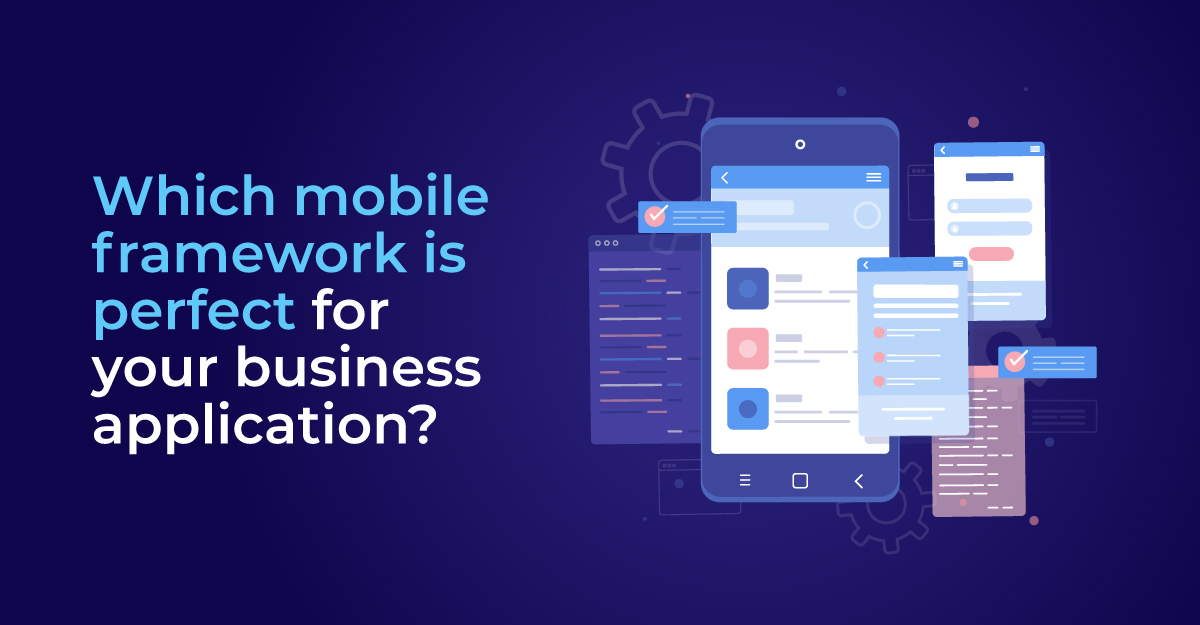The fact that more than 6 million apps are currently available for download on iOS and Android app stores clearly demonstrate where the business application market is heading. With more and more people turning to mobile usage, developing a cross-platform mobile application is a crucial component of a successful marketing strategy for businesses across sectors and industries.
Companies that decide to develop an application have several considerations, one of which is to choose the mobile framework. In this post, let us take a look at some of the most popular mobile frameworks available for app development to help you find the perfect one for your business application.
What’s Next?
Below, let us talk about a few mobile frameworks most commonly preferred by application developers and flutter mobile app development company in India because of their unique features and capabilities.
Flutter
A software development kit coming straight from Google, Flutter is one of the most popular mobile frameworks among developers for its faster coding capabilities. This framework strives to offer a streamlined app development experience with a single code base for both iOS and Android platforms.
Flutter lets developers modify existing widgets and create new ones easily and quickly. Flutter mobile app development helps businesses build a responsive mobile application that engages target audiences better and deliver the desired results.
Ionic
Though relatively young in the landscape, Ionic is quickly getting popular among businesses and used by giants like Twitter. It is a front-end mobile framework that allows building mobile applications using JavaScript, CSS, and HTML with a focus on the user interface.
Ionic provides you with an option to use AngularJS as well as SAAS for coding the apps. It also supports design components like toggle, header/footer, tab bar, etc. At present, it supports both Android and iOS mobile apps.
PhoneGap
One of the first frameworks made available for cross-platform application development, PhoneGap is popular for several reasons and is currently owned and run by Adobe. Just like Ionic, it is a front-end developer-friendly framework that lets developers use their JavaScript, CSS, and HTML skills to build apps that work across platforms.
What differentiates PhoneGap from other frameworks is its Developer App feature which allows making changes locally and previewing them instantly on devices. If you are planning to partner with a flutter mobile app development company India, this framework is a nice choice.
Corona SDK
Based on a lightweight coding language that focuses on portability, speed, ease, and extensibility, Corona SDK is ideal for developing mobile apps and games that demand fast responses. This framework suits beginners as well because it has a comprehensive website that provides all the guidance and knowledge you need to turn into a pro developer. Moreover, Corona SDK is completely free to use and works on both Windows and Mac OS.
React Native
This is an open-source version of the React JavaScript version from Facebook. React Native is used by many fortune 500 companies including Walmart, Tesla, Airbnb, Instagram, and more. Applications developed using React Native and Objective C are similar to a great extent as both use the same UI building blocks.
This framework makes it really easy for developers to build cross-platform apps while rendering a near-native experience to end users. Another amazing benefit is the huge community that you can turn to for any question or problem.
Appcelerator Titanium
This powerful mobile framework comes loaded with all the tools and capabilities you might need for building, testing, and deploying robust apps. It makes use of JavaScript to offer a huge selection of APIs. These APIs call the native features of the OS to enhance the app performance.
Appcelerator titanium works on a visual flutter mobile app development process based on pre-built code blocks that you can quickly put together through drag-drop. It also lets you test and monitor the finished applications from a comprehensive dashboard which provides useful insights into the app's performance.
Xamarin
Though relatively new in the area, Xamarin is quickly becoming a popular choice among developers for mobile app development. This framework uses C# for coding and then compiles the applications for different platforms, making it more affordable while bringing down the code-to-launch time.
One of the most important features of Xamarin is the ability to share the code with a PHP-based server. It also works well with Microsoft Visual Studio, allowing developers to work comfortably in a familiar environment.
The AppBuilder
A mobile framework used by some of the biggest enterprises across the world, The AppBuilder is famous for its codeless UI support and streamlined mobile app development. This framework is perfect for developing information-based apps.
The AppBuilder comes with a pre-built block that allows adding features like push notifications, polls, feedback, and analytics. One of the most impressive things about it is the ability to integrate seamlessly with Google Play, enabling single-click publishing for developers. It also offers highly accessible event content to help improve employee engagement and cost-effectiveness.
Intel XDK
This cross-platform mobile framework is known for developing responsive and interactive apps with the use of plugins. Intel XDK supports the latest technologies like IoT and the popular Node.js framework.
This app development framework simplifies emulation, debugging, testing, and other tasks. It also lets you preview the project in real time while making changes. Intel XDK is certainly one of the best frameworks for cross-platform flutter mobile app development.
GoNative
A framework trusted by startups to Fortune 100 companies for mobile app development, GoNative allows the creation of fully-featured native apps with minimal effort through plugins. It allows adding push notifications, in-app video calls, and other advanced features for an amazing end-user experience.
What makes this framework so popular is its ease of use and speed. It gets your mobile app live on Android as well as iOS app store in just a few days. Moreover, maintenance and updates are also simple with this native mobile app development platform.
Conclusion
These are some of the mobile frameworks you can consider for developing a mobile application for your business to elevate user experience and improve engagement as a part of an effective business strategy.



